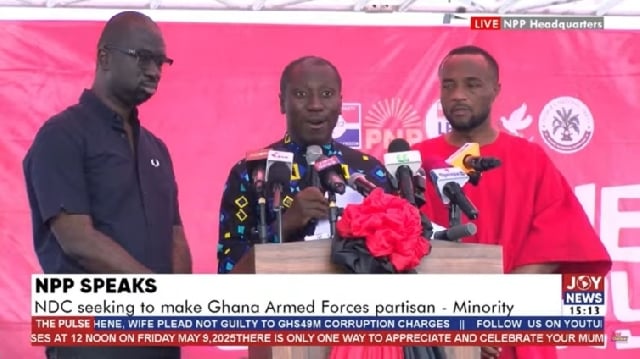The Ghanaian political landscape witnessed a clash between the ruling government and the opposition over alleged dismissals within the Ghana Armed Forces. The opposition New Patriotic Party (NPP), represented by its parliamentary minority, accused the government of unfairly removing senior military officers, suggesting political motivations behind the personnel changes. They argued that such actions threatened the professionalism and non-partisan nature of the military, a critical institution in any democratic society. This accusation sparked a strong rebuttal from the Minister for Defence, Dr. Edward Omane Boamah, who dismissed the NPP’s claims as baseless and lacking understanding of established military procedures.
Dr. Boamah challenged the Minority’s understanding of military protocols, stressing that the transitions in leadership were routine and consistent with long-standing traditions within the Ghana Armed Forces. He questioned whether the Minority’s allegations stemmed from genuine ignorance of these procedures or a deliberate attempt to politicize internal military affairs. The Minister emphasized the importance of respecting the established processes and refraining from undermining the integrity of the armed forces through unsubstantiated accusations. He highlighted the existence of a well-defined system for leadership changes within the military, implying that the NPP’s claims were an attempt to create unnecessary controversy.
To further solidify his argument, the Defence Minister pointed to a valedictory meeting held by the Chief of Defence Staff, Lieutenant General William Agyapong, with Two-Star Generals. This meeting, according to Dr. Boamah, served as evidence of the transparency and adherence to tradition in the recent leadership changes. The Ghana Armed Forces confirmed the meeting, which took place on April 28, 2025, and involved all serving Two-Star Generals. It was characterized as a formal recognition of outgoing officers, a customary practice within the military. The Defence Minister underscored the fact that even the affected generals acknowledged the process as a standard and respected protocol.
The Defence Minister’s response aimed to portray the leadership transitions as a routine internal matter, devoid of political interference. He emphasized that such transitions are a recurring aspect of military life, necessary for maintaining operational effectiveness and promoting career progression within the ranks. By highlighting the participation and acceptance of the outgoing generals in the valedictory meeting, Dr. Boamah sought to dispel any notion of forced removals or political victimization. He urged the opposition to refrain from politicizing the military and to respect the established procedures that govern personnel changes within the Armed Forces.
The core of the disagreement lies in the interpretation of the personnel changes within the Ghana Armed Forces. The NPP views these changes through a political lens, suspecting a deliberate purge of senior officers for political reasons. The government, however, maintains that the changes are purely procedural and in line with established military tradition. This clash of interpretations reflects the broader political dynamic between the ruling party and the opposition, where accusations of political manipulation are often exchanged. The situation underscores the sensitivity surrounding military affairs and the importance of maintaining public trust in the impartiality and professionalism of the armed forces.
While the Ministry of Defence refrained from releasing the names of the affected officers, it insisted on the procedural nature of the changes. This lack of specific information fuelled the opposition’s suspicions, leaving room for speculation and accusations. The government’s emphasis on established military tradition, coupled with the confirmation of the valedictory meeting, served as its primary defense against the NPP’s allegations. The situation highlights the delicate balance between transparency and the need for discretion in matters of national security and military personnel. The ongoing debate emphasizes the importance of clear communication and established procedures to avoid politicization of the armed forces and maintain public confidence in their integrity.














